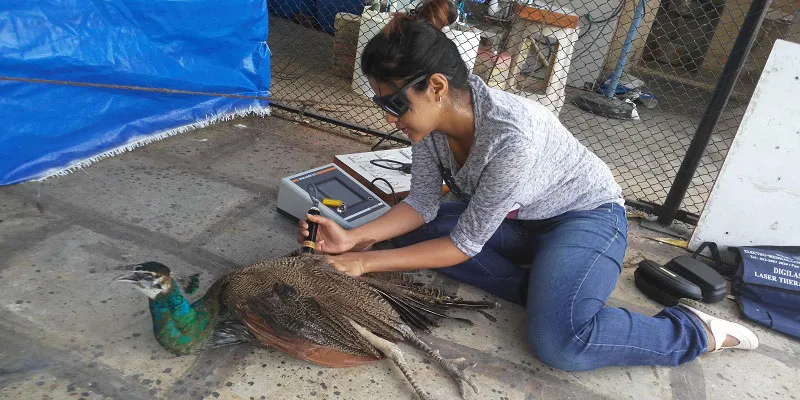“There were times I would be late for class as I would have been back from a snake rescue call. I used to ask my professor to keep the snake with him until I was done with college in the evening, and they (the college authorities) gladly obliged.”
Her patients range from the super intelligent African grey parrots to cockatoos and macaws. Among the more common birds, she has treated eagles, owls, falcons, mynahs, and house sparrows. A firm believer in the fact that birds are much more intelligent than dogs, Dr Rina Dev is a veterinarian committed to the avian cause.

She spends pretty much all her time rescuing animals in distress. Apart from her successful practice in Mumbai, she also takes on a lot of volunteer work. She was one of the first to step forward and join a team rescuing hundreds of injured livestock, dogs, and cats that had got crushed under rubble when the earthquake hit Nepal in April 2015. Thanks to her rescue efforts she was able to bring out a live cow from under the rubble, treat a couple of buffaloes and goats with fractures, as well as attend to injured poultry and ducks.. A lot of animals suffered due to secondary infections post the earthquake as there were dead carcasses lying everywhere, but Rina continued undeterred, volunteering her time and skills for two weeks after the disaster. Nepal was a challenging experience — not only was it a completely chaotic situation, but the landslides and tremors posed threats at every point. “We had no sense of timing, didn’t eat food until evening at times, travelled on difficult terrain coming across landslides to the most isolated villages on hills. But the satisfaction every night when we came back to our base camp was immense,” recalls Rina. Her name has hit national and international media several times for performing complicated surgeries on a turtle that had a fish hook stuck in its belly or a dehydrated seabird that nearly died of starvation. Rina is your modern day Dr Dolittle — if she had her way she would talk to the animals to make them feel better. But it wasn’t easy deciding what to do with her life.
A childhood passion turned profession
Rina recalls being obsessed with animals even while growing up. She says she got into veterinary medicine simply because she found it too expensive to pay the bills for all the animals she rescued as a child. This childhood passion launched into a full-time profession when Rina packed her bags and went off to Rajasthan to study medicine. But even in college her love for animals got her into trouble. Says Rina, “I got into the bad books of a lot of teachers initially because within one month of my entering college I had complained to authorities regarding a calf kept for embalming which is a very cruel process of preserving the cadaver — the animal dies a slow death. It is illegally practised by many veterinary colleges. Maneka Gandhi had called up my dean; he let the calf go loose but post that I was always taunted by students and teachers. Later people realised I was not the usual kid who joined vet school. I got very involved with wildlife rescue work in Jaipur, trained my batchmates to handle and rescue snakes, and organised first-aid camps for birds during Makar Sankranti.”
It was during her veterinary days that she decided to specialise in wildlife medicine. Her inclination was always toward wildlife — a niche subject that has yet to gain popularity in animal medical treatment in India. But there was no stopping her. “I did externships at zoos abroad and wildlife rescue centres, as in India we have minimal exposure when it comes to wildlife medicine and that is where I thought I could make a difference and contribute more. A funny incident I can think of was when I was studying in Jaipur, the zoo’s vet did not know how to give intravenous fluids to a leopard cub, so I used to go every day from college to the zoo to administer saline to the leopard cub.”
Is setting up private practice easy for vets?
Rina has been practising animal medicine for the last seven years, and admits she took a long time to decide whether to start her own practice or not. There is a lot of commitment and investment required, what with the need for operation theatres with world-class facilities like X-ray, sonography, and ECG machines. The risk factor is huge, as is the emotional stress attached to the job. But seven years on, Rina is now ready to branch out on her own — she is in the process of setting up her own clinic, which will cater to all kinds of companion animals, especially to birds and exotic pets. Her dream is to have a bird ICU unit to offer specialised surgeries for birds and reptiles.
Why bird medicine?
Rina claims she never really choose avian medicine — “I think it followed me! Since I was a kid I was into bringing birds home and treating them. I realised over a period of time that even the vets I took them to knew nothing about them, the reason being in veterinary school the only thing you’re taught about birds is concerning poultry, which means how to fatten up the bird, how to de-feather the bird, and even how to make chicken pickle!” So it was never the vets’ fault but the way the syllabus was based. Fortunately for her, she got to extern abroad and work in a zoo in the US while still in medical school. Her interest in bird medicine kept increasing and she tried to increase her knowledge by reading up on the internet.

Is keeping birds in captivity cruel?
One of the questions she is always asked is if she is advocating cruelty by treating birds kept in captivity. Rina is very clear — “I love birds but do not support the illegal trade. What we have to understand is the fact that the trade exists. I do not encourage people to go and get a bird as a pet, but at the same time I do make sure that if someone owns a pet bird they give him the the best environment to live in and the best health care”.
Animal victories
Some of the most interesting cases Dr Rina has handled include an ovarian hysterectomy for removing a retained egg from a budgerigar who weighed only 56gms. She was the tiniest patient she has operated on so far. Her routine practice includes a lot of orthopaedic surgeries for birds with fractured wings or limbs. “My patients poop over me, bite me, kiss me, and at times shiver when they see me. Just the other day I went to hold this African grey parrot and he said, ‘leave me’. Most of the larger parrots talk and they pretty much know what they are saying. Interacting with them can be quite interesting once you bond with them.” Perhaps her most challenging case on which she refused to give up was a paralysed peacock with a spinal cord injury brought to her by the forest department. “I am very passionate about birds, hence I put in an extra effort when it comes to avian medicine. This bird ideally had no hope. By international wildlife rescue rehabilitation protocols a bird like that would have been euthanised as she had no chance of survival in the wild. Living in captivity for the rest of her life too meant she would die a slow death as she was paralysed, which meant sores, breathing difficulty, and secondary complications. She had this spark in her eyes which defied her prevailing health condition.” Rina put in all her best efforts on the peacock and even started doing physiotherapy with her every day. As this hadn’t been previously attempted on birds, she didn’t have anybody she could consult. Writing to international vets did not help either. However, the paralysed bird responded so well to the treatment that today not only is she able to stand and walk on her own, but she is attempting to fly too! Rina is proud to state that this monsoon she plans to release the bird back into the wild!
Future plans
Someone she is indebted to for life is Dr Roberto Aguilar, a wildlife veterinarian whom she met at Phoenix Zoo in the US, and who is also her mentor. His passion for wildlife medicine, his knowledge, and his dedication inspired Rina. For the future, Rina hopes that the system of veterinary education improves in India and there is greater scope for the next generation to learn about niche subject areas like wildlife medicine. She hopes to contribute to pet care through her soon-to-be set up clinic and then in the long run contribute to the scientific breeding of endangered birds. But that’s all in the future. As her patients wait for their turn to be treated by Dr Rina Dev, here’s hoping for more wind beneath the wings of our very own Dr Dolittle.







